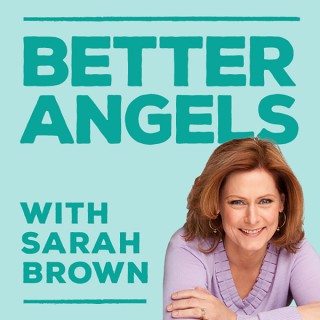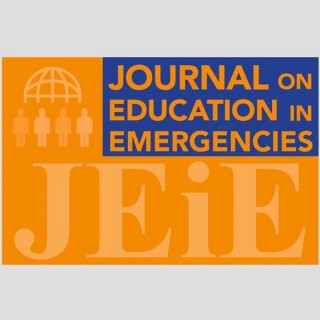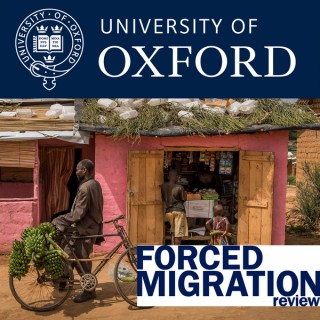Podcasts about refugee education
- 24PODCASTS
- 32EPISODES
- 25mAVG DURATION
- ?INFREQUENT EPISODES
- Apr 11, 2023LATEST
POPULARITY
Best podcasts about refugee education
Latest news about refugee education
- We need a Marshall Plan for refugee education Just In | The Hill - May 1, 2024
- Empowering refugee education through sports, solidarity The Malaysian Insight - Apr 2, 2024
- $9.3bn Required Annually for Refugee Education in Developing Nations - World Bank AllAfrica News: Nigeria - Dec 27, 2023
- Leave no one behind: Forum calls for greater focus on refugee education Saudi Arabia - Mar 8, 2023
- Snowfall Climatology Toolbox, Hub for European Refugee Education, Fast Food Index, More: Saturday ResearchBuzz, December 10, 2022 ResearchBuzz - Dec 10, 2022
- Saifuddin proposes OIC to set up refugee education foundation NST Online Latest News - All - Oct 5, 2022
Latest podcast episodes about refugee education
Learning and Educating Across Refugee/(Im)migrant Networks (LEARN)
In this episode, Sean and Punya talk with colleagues who are working toward ways educators, learners, researchers, practitioners, and policymakers can address the learning and teaching of refugees/(im)migrants?LEARN LFC Description: In this project, we will bring together refugees, educators, and researchers with those in global and community organizations to 1.) identify key areas of needed research on the education of refugee/(im)migrants and to 2.) develop intentional and inclusive collectives to both conduct research and to use research findings to build necessary supports for refugee/(im)migrant communities in Arizona, the United States (US), and globally. We situate refugee/(im)migrants and teachers as both learners and educators, who deserve support not only from organizations,but also from academic institutions.Guest Information: Shyla DoganShyla, a graduate of ASU's Educational Leadership and Policy Ph.D. program, is an Assistant Professor of Education Studies at ASU's Mary Lou Fulton Teachers College (MLFTC).Nasir Ahmad KaihanNasir is a Ph.D. student at MLFTC.Adnan TuranAdnan is a Ph.D. student at MLFTC.Links & More Information:Learning Futures Collaborative: Learning and Educating Across Refugee/(Im)migrant Networks (LEARN)1951 Refugee ConventionPunya's blog post: Things we hold on to (in a shifting world)International Organization of Migration (IOM)Silver Linings for Learning (Feb 2023). Episode 140, Bans Don't Work in an Open World: Afghan Women Find Educational Opportunities in BangladeshPresident's Alliance on Higher Education and ImmigrationHamid, Mohsin (2017). Exit West. Penguin Random House [publisher link]
Mission Network News (Fri, 06 Jan 2023 - 4.5 min)
Today's HeadlinesCOVID-19 cases rise in ChinaSchool of Hope empowers Syria's “lost generation”Texas Church shares Jesus and food
Welcome to America: How one education entrepreneur is transforming refugee education
I came across the work of our guest today, Luma Mufleh, back in 2019. Even then, I was enchanted by the story of how she created Fugees Academy, a successful private school in Georgia for refugee children who are too often overlooked and underserved in traditional district schools. But I recently finished reading Luma's newly released book, Learning America: One Woman's Fight for Educational Justice for Refugee Children, which joins the story of Fugees Academy with her own powerful story as an immigrant, entrepreneur, soccer coach, school founder and change maker, and wife and mother. Truthfully, Learning America is one of the most extraordinary books I have read in awhile, and it should definitely be on the top of your list of books to read this summer. Fugees Family Luma Mufleh's 2017 TED Talk
Harvard Professor Sarah Dryden-Peterson knows that we can do a lot better for the nearly 30 million refugees in the world. As an expert on refugee education, she says education needs to create better supports for displaced children whose education is disrupted, dominated by exclusion and uncertainty about the future. In her latest research, she shares how governments and international agencies have been hindered in this work and how refugee teachers and students are leading the way to better educational supports. In this episode, she reflects on the current conflict between Russia and Ukraine, and offers insight into what we've learned from other humanitarian crises.
In this episode, we are joined by two writers based in Indonesia who speak with members of their communities.Firstly, Elina Mark works with two non-profit educational organisations: Education 4All and Beyond the Fabric. Elina speaks about educational barriers refugee children face with the co-founder of the 4all, Faiza Ahmed Omer Faloul. Now focusing on delivering online education, 4all is a refugee-run organisation that Faiza help set-up to fill a void, challenge the status quo and help the broader refugee community in Indonesia.*Then, writer Nimo Ahmed voices some of the issues refugee women face as she speaks with two women Hodan and Fahma who have been in Indonesia after leaving Somalia. Nimo's writing aims to uncover social and cultural problems refugee women face. *4all is currently fundraising in order to reach more people in need of their educational services across Indonesia. To donate: https://ensany.com/campaign/3998
FreshEd #248 – Refugee Education and Language of Instruction (Celia Reddick & Sarah Dryden-Peterson)
Today we explore the language of instruction in refugee education. Although learning in a home language is important, often it's impossible for refugee children. Such tensions have important implications for refugee futures which are often unknowable. My guests are Celia Reddick and Sarah Dryden-Peterson who have recently co-written a new book chapter entitled “Refugee Education and Medium of Instruction: Tensions in Theory, Policy, and Practice.” Celia Reddick is a PhD Candidate in Education at Harvard where Sarah Dryden-Peterson is an Associate Professor and Director of REACH. www.freshedpodcast.com/reddick-dryden-peterson/ -- Get in touch! Twitter: @FreshEdpodcast Facebook: FreshEd Email: info@freshedpodcast.com Support FreshEd: www.freshedpodcast.com/donate
Dr. Sarah Dryden-Peterson - Refugee Education: From Uncertainty to Creative Futures
Ronald Beghetto talks with Dr. Sarah Dryden-Peterson about REACH, a program she leads to create and facilitate welcoming and inclusive education to refugees in different parts of the world. She shares how educators can help refugee students make navigational decisions between what exists and what could be, and realize that their malleable histories and identities are what makes them part of communities. Dryden-Peterson explains how refugees, surrounded by uncertainty and disruption, provide an example for us as we emerge from the pandemic. You can learn more about Dr. Sarah Dryden-Peterson and her work by accessing her directory page at Harvard, and also the REACH webpage.
Their Story is Our Story E50 The Tycoons break the normal mold for this show and interview Sherianne and Robin of the non-profit organization, Their Story is Our Story. This is a great show highlighting the passion for volunteerism and the framework for purposeful living. Sherianne and Robin give an inspiring picture of real refugee […] The post Their Story is Our Story E50 appeared first on Business RadioX ®.
Their Story is Our Story E50 The Tycoons break the normal mold for this show and interview Sherianne and Robin of the non-profit organization, Their Story is Our Story. This is a great show highlighting the passion for volunteerism and the framework for purposeful living. Sherianne and Robin give an inspiring picture of real refugee […] The post Their Story is Our Story E50 appeared first on Business RadioX ®.
Their Story is Our Story E50 The Tycoons break the normal mold for this show and interview Sherianne and Robin of the non-profit organization, Their Story is Our Story. This is a great show highlighting the passion for volunteerism and the framework for purposeful living. Sherianne and Robin give an inspiring picture of real refugee […]
Transformative Learning for Refugee Youth with Amala Education
Gareth is joined by Polly Akhurst and Louie Barnett from Amala Education to discuss the ongoing global refugee crisis, barriers to educational access, and Amala’s transformative learning model and high school diploma program designed to empower refugee youth.
कोविड-19: शरणार्थी बच्चों की शिक्षा पर विनाशकारी प्रभाव
शरणार्थी मामलों की संयुक्त राष्ट्र एजेंसी (UNHCR) ने गुरुवार को एक नई रिपोर्ट ‘Coming Together for Refugee Education' पेश की है, जिसमें यह आशंका जताई गई है कि स्कूल बन्द होने, ज़्यादा फ़ीस होने या दूरस्थ शिक्षा के लिये तकनीक तक पहुँच ना होने के कारण बड़ी संख्या में शरणार्थी बच्चे अपनी पढ़ाई जारी रखने में असमर्थ होंगे. इस रिपोर्ट के बारे में और जानकारी के लिये हमारी सहयोगी, अंशु शर्मा ने बात की भारत में यूएनएचसीआर के एक सहायका अधिकारी किरी अत्री से.
Refugee camps in Greece remain overcrowded and unhygienic beyond imagination, but until Covid-19 struck new education centres were a daily lifeline for children who had fled conflict and persecution, many arriving after perilous journeys from Syria, Afghanistan and Iraq. This episode provides a glimpse into life in those camps and talks to the team behind Theirworld’s new report that offers a way forward out of the refugee education crisis. Sarah talks to organisations making a difference there, and to two refugees who shed their personal light on what those on the islands are going through. Sarah talks to Maysa Jalbout, author of the report ‘Finding Solutions to Greece’s Refugee Education Crisis’; Justin van Fleet, president, Theirworld; Abi Hewitt, CEO and co-founder of Love Welcomes; Tanko Doris Laure, refugee from Cameroon; Sanda Leslie, refugee from Cameroon; Josie Naughton, chief executive officer, Help Refugees; Naoko Imoto, education chief UNICEF Partnership Office in Greece. Theirworld is a major funder of education on the Greek Islands – with the support of the People’s Postcode Lotteries and our many individual supporters – in partnering with Education Cannot Wait, UNICEF, UNHCR and many local charities and groups.
Global Refugee Education--in a Pandemic
At this week's Round Table, Inica, Julianna, and Olivia discuss global refugee education with Chrystina Russell, Executive Director of the visionary Global Education Movement (GEM) at Southern New Hampshire University. Even BEFORE the COVID-19 pandemic, over 70 million people were displaced worldwide, with over 25 million people living as refugees. Currently, just 3% of refugees are in higher education compared to 34% of the non refugee population globally. GEM was created to bring university education and employment pathways to refugees and traditionally underserved learners through a blended learning model that is all the more relevant at this time when much of the world has been forced to do remote learning. We had a rich conversation about refugees, what works and what's challenging about online learning, and what it will take to increase and improve learning opportunities for transient and vulnerable populations. Thanks for joining us and we hope you enjoy the podcast! --- Send in a voice message: https://anchor.fm/nextgenpolitics/message
[Behind the Pages] Asking "Why" and "How": A Historical Turn in Refugee Education Research
This is an episode of Behind the Pages - the podcast of the Journal on Education in Emergencies. Join us for these exciting and timely conversations with JEiE authors about their work on education in regions affected by crisis and conflict. Emergency relief prioritizes basic survival needs like food, water, medical aid, sanitation, and shelter. But increasingly some humanitarians have begun to think of education not only as capable of improving lives, but indeed as lifesaving. In "Asking 'Why' and 'How': A Historical Turn in Refugee Education Research” Christine Monaghan identifies key shifts in the motivation behind refugee education through the lens of a historical perspective. Drawing from oral histories, interviews, and archival research, Monaghan constructs a narrative of “why” and “how” refugee education programming has become a form of immediate emergency response. This article is available, in its entirety, for free here: https://inee.org/collections/journal-education-emergencies-volume-5-number-1
International Human Rights: refugees and refugee education
At this week's Round Table, Sara Chough, Julianna Davis, and Riya Mehta speak with Tujiza Uwituze, East Africa Representative for the Global Education Movement (GEM) at Southern New Hampshire University, focusing on one of the foremost human rights--education--as it plays out in Rwanda, as part of our ongoing series on human rights around the world. Thanks for listening! --- Send in a voice message: https://anchor.fm/nextgenpolitics/message
FreshEd #181 – Futures of Refugee Education (Sarah Dryden - Peterson)
What are the possible futures presupposed within the organization of refugee education worldwide? Do the understood purposes of refugee education align at the global, national and school levels? My guest today is Sarah Dryden-Peterson, an Associate Professor at the Harvard Graduate School of Education who has been researching refugee education for 15 years. Together with Elizabeth Adelman, Michelle Bellino, and Vidur Chopra, she has recently co-authored an article for the journal Sociology of Education that looks at the purposes of refugee education today. Sarah and her colleagues argue that quality refugee education must further a sense of belongingness. -- www.freshedpodcast.com/sarah-dryden-peterson Twitter: @FreshEdpodcast Facebook: FreshEd Email: info@freshedpodcast.com
Special guest Andrea joins us in this episode, where we talk about the on-the-ground realities and challenges of refugee education. This episode wraps up our 3-part series on SDG4 and Refugee Education. --- Send in a voice message: https://anchor.fm/whats-indie-news/message
School Based Approaches for Mental Health Interventions
Outlining the opportunities schools have to work on their own school culture to best support refugee children with mental health problems, and unaccompanied refugee children in schools.
Psychological Assessment Approaches for Refugee Children
Barriers, diagnostic difficulties, and cultural and language considerations for doing a thorough psychological assessment.
FMR 60 - Refugee education in Greece: integration or segregation?
Education: needs, rights and access in displacement (FMR 60)
Although education policies have been devised to integrate these children into the Greek education system, these policies have actually led to some students being segregated. The closure of the ‘Balkan route’ in the spring of 2016 has trapped around 21,000 children in Greece. Although education policies have been devised to integrate these children into the Greek education system, these policies have actually led to some students being segregated.
FMR 60 - Inter-sectoral cooperation for Afghan refugee education in Iran
Education: needs, rights and access in displacement (FMR 60)
A recent decree in Iran removed a legal barrier to undocumented refugee children attending school but other barriers remain. One non-governmental organisation discusses the successes and challenges of adopting an inter-sectoral approach.
Sometimes we want to help but feel there is nothing we can do. Well what about getting your workplace involved? Sarah Rogerson watched the Syrian refugee crisis unfold on her TV and together with Chloe Shaw got their employer Cambridge Assessment English involved and are making huge steps in helping refugees back into education. See acast.com/privacy for privacy and opt-out information.
ASU's Refugee Education and Clinic Team (R.E.A.C.T.) works with refugee communities in the valley, providing free health-care education and resources. Working in partnership with nonprofits and medical providers, R.E.A.C.T. aims to help make the transition to life in the United States easier for refugees throughout Arizona.
FMR 58 Refugee-led social protection - Refugee-led education in Indonesia
Economies: rights and access to work (Forced Migration Review 58)
Refugee-led education initiatives in West Java, Indonesia, show how refugee communities can work with supporters to overcome service gaps faced in host countries.
FMR 57 - Private sector engagement in refugee education
The involvement of the private sector in providing education for Syrian refugees has much to commend it but greater consideration needs to be paid to the ethical and practical concerns that may arise.
Refugee Education: How SNHU Is Helping Refugees Get a New Start
In this interview from the 2018 LearnLaunch conference, we speak with Chrystina Russell, Executive Director of SNHU's Global Education Movement (GEM), about how the school is using its educational resources and partnerships abroad to help train refugees for new jobs.
John Palmer, Associate Professor and Chair of Educational Studies at Colgate University, reflects on refugee education in the Korean peninsula and beyond.
FreshEd #94 – Portraying refugee education (Sarah Dryden-Peterson)
Across the globe, millions of people have been displaced from their homes. How does the international community respond to this humanitarian crisis? What is the role of education? My guest today is Sarah Dryden-Peterson. She leads a research program that focuses on the connections between education and community development, specifically the role that education plays in building peaceful and participatory societies, particularly in conflict and post-conflict settings. She is concerned with the interplay between local experiences of children, families, and teachers and the development and implementation of national and international policy. Sarah has recently written an article entitled “Refugee education: Education for an unknowable future” in a special issue of the journal Curriculum Inquiry that rethinks refugee education Sarah Dryden-Peterson is an Associate Professor at the Harvard Graduate School of Education. She taught middle school in Boston, founded non-profits in South Africa and Uganda, and has two school-aged children.
Father Lawrence Frizzell interviews Ms. Alice Benishyaka about her work in Refugee Education and her participation in the forum on “Expanding Youth Learning and Opportunity Pathways in, and Linked to, West Africa,” which was held at the University of Ghana Business School in collaboration with the Joseph C. Cornwell Centre for Metropolitan Studies, Rutgers University.
FMR 55 General - The power of education in refugees' lives: Sri Lankan refugees in India
In their determination to take control of an uncertain future, Sri Lankan refugees living in the camps of Tamil Nadu, India, have prioritised education.
How Do You Solve A Problem Like...Refugee Education
How do you actually make big change happen? In this episode, Sarah Brown explores the challenge of how to educate Syrian children who have been forced to flee their homes and schools due to the ongoing war. What are all the elements involved in getting hundreds of thousands of Syrian back to school and learning? The episode focuses on education but has wider lessons about how big problems can be solved, even in the face of overwhelming crisis. This is an example of how campaigns create change, and what can be achieved when leaders and activists come together. Sarah Brown talks to Elias Bou Saab, former Minister of Education in Lebanon, Christos Stylianides, EU Commissioner for Humanitarian Aid and Crisis Management, Julia Gillard, former Australian Prime Minister, now Chair of the Global Partnership for Education, Dr Justin van Fleet, Director of the Commission for Financing Education Opportunity and chief adviser for Theirworld, Weded Antawi, a Palestinian computer science student campaigning for global education and Nour, 14 year old Syrian schoolgirl.



























